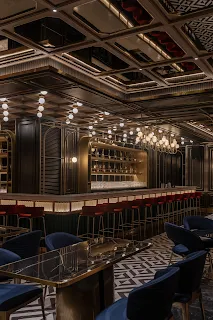Featuring Rajesh, Principal Consultant – Gourmet Sage Hospitality Solutions
The allure of launching a bar or restobar is undeniable—buzzing nightlife, curated cocktails, ambient lighting, and social clout. But for every successful bar that thrives, there are many that shut down within their first year, often due to poor planning, missed fundamentals, or a lack of expert guidance.
Rajesh, the award-winning consultant behind some of South India’s most loved restaurants and restobars, shares key insights on what aspiring bar owners need to know before they take the plunge. With over two decades of experience in the food and beverage industry—and a deep track record of building successful F&B brands—he offers practical, experience-led advice for those looking to enter the world of bars, microbreweries, or nightclubs in India.
1. Begin with a Clear Concept
According to Rajesh, concept clarity is non-negotiable. “Don’t start with décor or glassware. Start with a clear answer to: What kind of bar are you building? Who is it for? What’s the vibe? What’s the revenue model?”
He warns against blindly replicating trendy formats from metros or abroad without considering the location’s social and legal dynamics. The strongest concepts, he says, come from a combination of personal passion, market understanding, and operational logic.
Projects like CRIMSON—a refined, Parisian-inspired jazz bar themed around classic cinema—and FIFTH, a modern Indian-Asian restobar with dry-aged meats and Santa Maria-style Argentinian grilling, are examples of how distinctive, well-rooted concepts can set a venue apart in an increasingly crowded market.
2. Decode the Licensing Landscape Early
Liquor licensing remains one of the biggest pain points in setting up a bar in India. “Each state has its own set of excise rules, approvals, and limitations. One mistake or oversight can cost you months—or worse, stall your project indefinitely,” Rajesh explains.
He advises future bar owners to start their licensing process as early as possible and to always work with a consultant or legal expert who understands the intricacies of state regulations.
3. Good Design Goes Beyond Aesthetics
Rajesh emphasizes that a successful bar layout should not only look good but also work well. “Design is not just about Instagrammable corners. It’s about ensuring seamless service flow, guest movement, space optimization, and even noise zoning,” he says.
He strongly recommends involving professionals who understand the operational demands of bars—not just architects or decorators—so that the final space balances both form and function.
4. Bar Equipment Is a Strategic Investment
Many first-time bar owners underbudget when it comes to equipment. Rajesh sees this as a critical misstep. “Your bar is your performance zone. If you’re under-equipped, your team can’t deliver speed, consistency, or quality—especially during peak hours.”
He outlines essentials such as adequate refrigeration, proper glassware, fast ice production, and prep stations as foundational to smooth operations
5. Team Building and Training Should Be Ongoing
A well-designed bar is only as good as the people running it. “The hiring process must focus on skill, culture fit, and attitude. But it doesn’t stop there,” Rajesh says. He believes in setting up robust training protocols—not just at the start, but as a regular and evolving practice.
From SOPs and guest experience to mixology refinement and hygiene protocols, his projects emphasize people-first development to ensure long-term sustainability.
6. Global Trends Are Great—When Adapted Smartly
The bar world is constantly evolving. From global shifts toward low-ABV and zero-proof cocktails to fire-led culinary theatrics behind the counter, there’s no shortage of innovation.
However, Rajesh cautions against chasing trends for the sake of novelty. “India is a unique market. Guests here want value, visual appeal, and trust. The key is to integrate international elements that elevate the experience while staying aligned to your audience.”
Take FIFTH, for example—besides its progressive Indian-Asian food and umami-driven culinary philosophy, it’s also the first venue in Tamil Nadu to introduce the Santa Maria-style Argentinian open-fire grill technique. It's bold, primal, and refined—all at once, and executed with discipline.
7. Pre-Launch Marketing Matters
In today's digital-first world, Rajesh encourages bar owners to build anticipation before the first drink is poured. Teaser campaigns, curated trials, influencer evenings, and storytelling around the brand can significantly boost Day One footfall.
“But marketing must be backed by substance. Authenticity wins in the long run” he adds.
Final Word
Setting up a bar isn’t just about good cocktails and music. It’s about precision planning, legal clarity, guest-centricity, and operational excellence. Rajesh, through his consulting firm Gourmet Sage Hospitality Solutions, has helped launch numerous successful restobars and bar-centric concepts across India—from elevated, genre-defining spaces like CRIMSON to innovative, coastal restobars like FIFTH.
His advice to aspiring bar owners? “Dream big, but plan smarter. If you get the basics right, your bar has every chance to thrive—not just open.”
About the Expert
Rajesh is one of India’s most respected food and beverage consultants and the Principal Consultant at Gourmet Sage Hospitality Solutions. With over 25 years of experience and award-winning projects across restaurants, cafés, bars, and restobars, he is known for his holistic approach—from concept ideation to post-launch support.
Learn more at www.gourmetsage.com
Connect on LinkedIn: linkedin.com/in/gourmetsage
Email: mailgourmetsage@gmail.com


